e-sports featured as a cultural project in the National Sports Festival
Japan’s e-sports elevated to a new stage
By Tominari Sano, journalist
From the Winter Issue of the electronic “Salaam Quarterly Bulletin”, No.31, November 2019
In the 74th National Sports Festival held in Ibaraki Prefecture (September 28th to October 8th), 1)e-sports were held for the first time as part of the cultural project on October 5th and 6th. Approximately 600 representative players from all prefectures that won local qualifying games gathered at the Tsukuba International Conference Center in Tsukuba City, and engaged in an intense battle. This is the first tournament approved by the country, and the first e-sports champion was born.
As a cultural project of the National Sports Festival
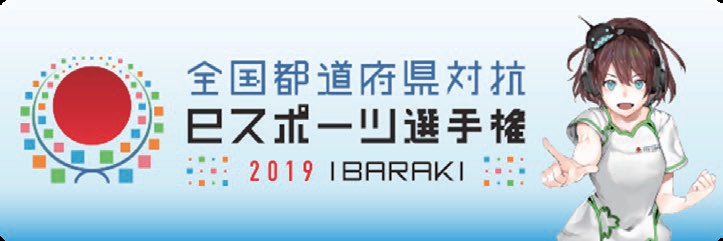
The “National Prefectural Competition e-Sports Championship 2019 IBARAKI” was held in Ibaraki Prefecture from October 4th to October 6th, 2019, along with the “National Sports Festival (Kokutai)” which is a “Sports Festival”. This tournament was held as the largest e-sports event in Japan.
Governor Kazuhiko Oigawa from Ibaraki Prefecture, who invited the tournament as a 2)cultural program for the National Sports Festival, said passionately, “E-sports are a sport in which various people can participate regardless of age, gender, or disability. That is why I have been feeling that it can be held as a part of the National Sports Festival. It is a good opportunity for young people to pay attention to the NSF, and the image of the prefecture can be improved.
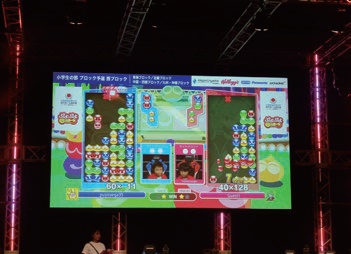
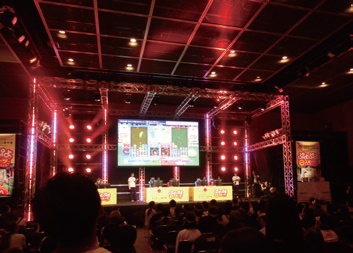
Watching the game through the big screen set up at the game venue of “Puyo Puyo” which was filled with excitement
In the National Sports Festival, three tournament events were held: the racing game “Gran Turismo SPORTS”, the sports game “Winning Eleven” (soccer), and the puzzle game “Puyo Puyo”. Players of each game title who won the qualifying nationwide preliminary gathered at the Tsukuba International Conference Center (Tsukuba City, Ibaraki Prefecture), and the total number of players is about 600 from the elementary school low grade to 48 years old.
Hideki Okamura, chairman of the Japan E-sports Union (JeSU), said, “JeSU was just launched last year, but it was good that e-sports could be held as a NSF cultural project.”
Three types of e-sports competitions
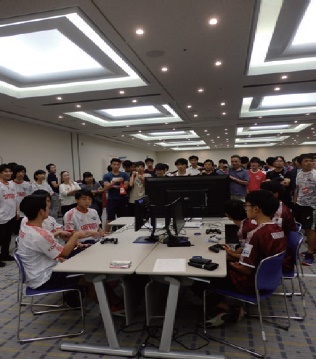
League preliminaries for prefecture competition e-sports “Winning Eleven” held at Tsukuba International Conference Center
“Winning Eleven”
After all, “Winning Eleven” is a representative of e-sports. It is a groundbreaking soccer game developed by Konami in 1995. Its simple operation and refreshing feeling from shoots attracted many enthusiasts of Japanese soccer players. The popularity of the “Winning Eleven” series continues to rise until mid-2000s, driven by the rise of Japanese soccer boom stimulated by the Japan-Korea World Cup.
It was overshadowed by the popularity of “FIFA series” for the next 10 years, but the popularity has been steadily recovering over the past 5 years, and this year’s 20th series opened against that background.
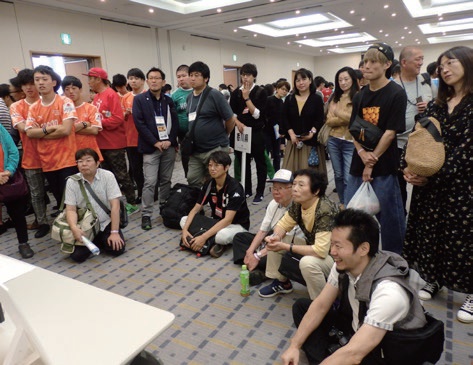
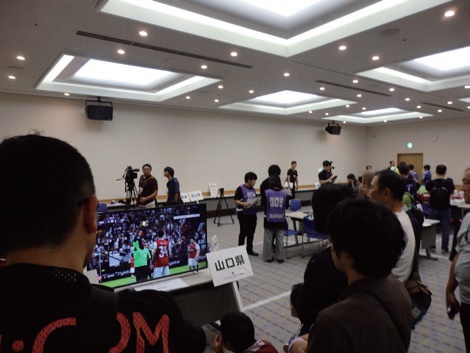
Prefectural representatives and associates looking at the game through a monitor
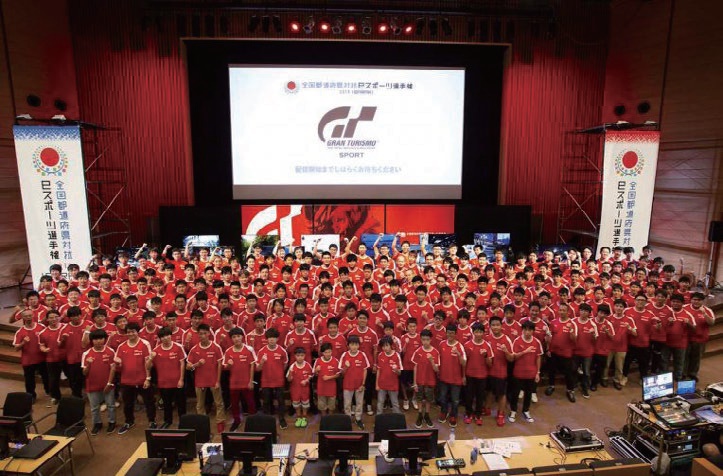
First e-sports championship using Gran Turismo in Ibaraki NSF
“Gran Turismo”
It is a uniquely developed title among e-sports. International competitions are held with the support of the International Automobile Federation (FIA), which supervises F1 and other auto racing. Since the controller plays on a dedicated deck such as an actual car racing chair and stealing wheel, accelerator, brake pedal, etc., it is not something that uses equipment such as a personal computer.
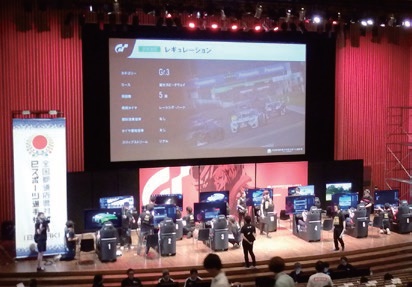
Large conference hall that was the venue for the qualifying preliminary and final of “Gran Turismo SPORTS”
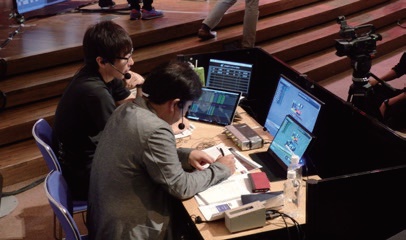
Indispensable to liven up games and venues
“Winning Eleven” and “Gran Turismo” attracted attention by participation of professional gamers
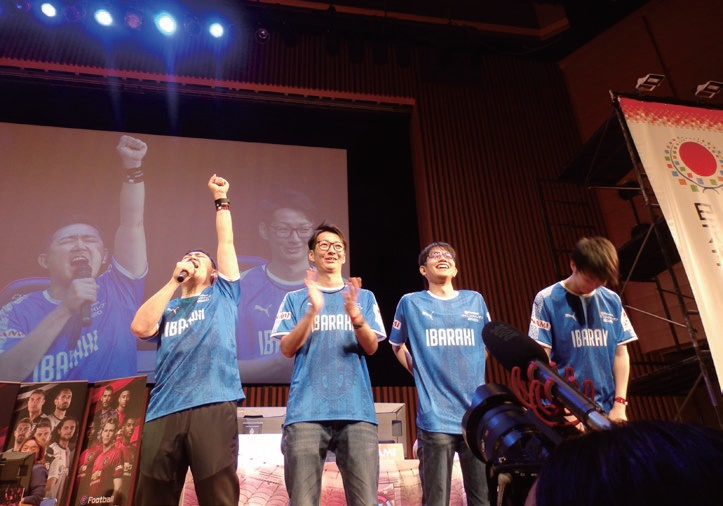
The second team of Ibaraki Prefecture who won the “Winning Eleven” final and won the competition between the Ibaraki Prefecture teams. Second from right is professional gamer Tsubasa Aihara also known as “Leva” who won a gold medal at last year’s Asian Games.
Players who are active in the world participated in “Winning Eleven” and “Gran Turismo”. In “Winning Eleven”, Tsubasa Aihara, a professional gamer also known as “Leva” who won a gold medal in the Asian Games last year, participated as a member of the second team of Ibaraki and contributed to the victory.
Tsubasa Aihara said, “I am grateful about such a tournament. So far I have come on a one-on-one basis and have won a professional license (of Winning Eleven). I have little experience of three-on-three battle so I thought I made a mistake at the end. But all persevered.” His cheeks turned red with a different sense of victory.
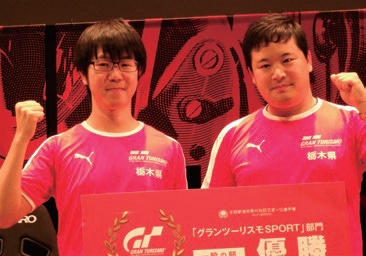
Tomoaki Yamanaka (left) and Takuya Takahashi (right) won the Gran Turismo General Part
On the other hand, in the general part of “Gran Turismo”, Tochigi Prefecture representatives Tomoaki Yamanaka and Takuya Takahashi won the championship.
Both Yamanaka and Takahashi are known as the representative faces of Japan in “Gran Turismo”. Especially Yamanaka is highly evaluated by Japanese professional drivers in real car racing as a player who commands attention. Takahashi is also active as a professional.
As Yamanaka said from the beginning that he “wanted to win the NSF championship more than the world championship”, expressing his enthusiasm for the NSF event, top players’ participation in NSF is very significant.
The status of e-sports in Japan that is not yet high
The world’s e-sports player population is about 100 million, but Japan has 3.9 million. On the other hand, it is said that there are 380 million spectators and viewers other than player population, and 1.6 million in Japan. With regard to the viewer population, watching online games through the Internet (distributed videos such as YouTube ones) is more common than watching them through TV and cable TV, but those are less in Japan in terms of competition population and viewers.
One of the reasons for that is the question “Is the game a sport?” Speaking of sports, there is a strong perception that it is something which moves the body. Since sports also have a meaning of “enjoying”, e-sports are also recognized as sports overseas. Compared to the expansion of recognition as a global e-sports, the domestic situation is still lagging far behind. Under these circum-stances, it can be said that it was very significant that e-sports were held as a cultural project, although it was not an official NSF event.
International e-Sports Federation
Leopold Chan, secretary general of the International e-Sports Federation (IeSF, headquarters: Korea), who spoke about the current status of e-sports at the Tokyo Game Show held at Makuhari Messe (Chiba City, Chiba) in Japan every September, had a keen interest in hosting e-sports during the recent NSF.
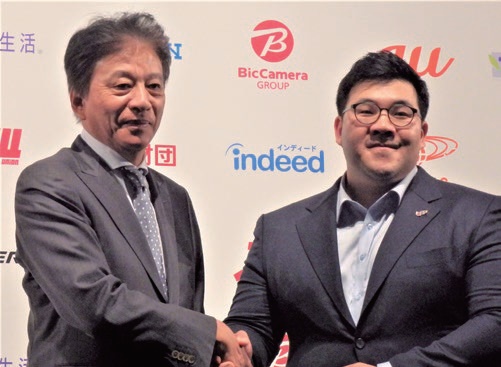
Hideki Okamoto, Chairman of the Japan e-Sports Union (left) and Leopold Chan, Secretary General of the International E-Sports Federation, at the Tokyo Game Show
Mr. Chan said in a speech, “Currently, we have 56 member countries in the International e-Sports Federation, of which 31 countries recognized e-sports as sports through the Ministry of Sports or international organizations such as the Olympic Committee. We will also actively promote the establishment of organizations such as efforts to guarantee and support efforts against doping and players’ life after retirement.”
Although support after retirement is an issue in real sports, and even though e-sports have not been incorporated as a sporting event of the International Olympic Committee (IOC), the environment is being improved toward that. In this respect, it seems that they are seriously considering it as an Olympic event.
E-sports National Training Center has been also established to nurture e-sports players and improve their educational environment. In recently joined Mexico, the establishment of a national training center was announced.
Significance of Japan e-Sports Union (JeSU)’s membership in the International e-Sports Federation
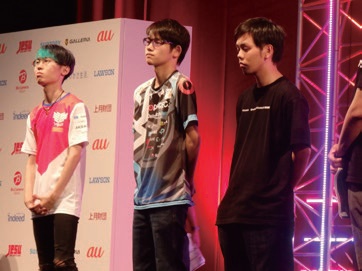
Leva (Tsubasa Aihara) who participated in the 2019 Tokyo Game Show event competition before his participating in NSF (center)
In fact, People’s mindset about e-sports is most unfavorable in Japan. Still, the Sports Agency and the Japan Olympic Committee (JOC) do not recognize it as a sport. However, Secretary General Chan has admitted that Japan has a great influence on the global gaming industry. Although the market is small, the eyes of Japanese users who evaluate the quality of the game are severe. Therefore, overseas game software developers care about thevoices of Japanese users. It is perceived as a status to be highly evaluated at the Game Grand Prix in at the Tokyo Game Show, which recognizes excellent game works and works supported by users.
When the Japan e-Sports Union (JeSU) founded last year expressed a desire to join the International e-Sports Federation, he expressed his welcome from the bottom of his heart. Mr. Chan said, “Japan’s membership is a big news.”
Participation of e-sports in NSF as a cultural project is a big step
Hideki Okamura, chairman of the Japan e-Sports Union, said, “What you could do at the National Sports Festival (although it is a cultural project) is very important. It is a stepping stone for the future. This success is the first step. The name value of NSF is big,” after the conclusion of the Festival. In addition, inquiries about e-sports have been received from Kagoshima Prefecture, which is the venue for the National Sports Festival next year.
The Japan e-Sports Union has just been born as an organization and is not yet firmly organized. There are many issues that need to be addressed, such as public relations, training, and welfare. However, regarding public relations, he said, “We will actively respond to requests for school lectures and explanations about e-sports.”
Having held e-sports at the Ibaraki Yume National Sports Festival in Ibaraki Prefecture is no doubt a big step for Japan in the future.
Responding to “gaming disorder”
The World Health Organization (WHO) officially recognized “gaming disorder” as an international disease this year. It was treated the same as addiction such as alcoholism. In response to this, Chairman Okamura said, “The Japan e-Sports Union would like to announce a formal view on this matter,” and expressed his desire to announce an official view while discussing the analysis and measures of each specialized department (although he didn’t specify the timing).
By the way, when I talked to the winners at the Ibaraki Yume National Sports Festival, a response of 2 to 3 hours on average was given by each. Furthermore, when asked “Was there a promise with the parents or child?” they answered no. Yamanaka who is the winner of the Gran Turismo SPORTS general event said, “It doesn’t make sense to do it for a long time. Even if you secludeyourself, your skill does not improve. For me, it is better to touch it for just 15 minutes every day without fail.” Aihara, also known as “Leva”, of “Winning Eleven”, clearly stated, “I didn’t make a promise with my parents”.
It seems that it depends on the title, but it may be that “quality” is more important than “quantity” to fight the world.
Challenges for e-sports to become official Olympic events
The International e-Sports Federation used to set the goal of making e-sports an official Olympic event by 2024 or 2028. But at this time, it only says it will “pursue the goal to make e-sports to be an official Olympic event” without specifying the timing.
Regarding the statement of President Thomas Bach of the International Olympic Committee saying “violent work is not suitable for the Olympic Games,” Secretary General Chan of the International e-Sports Federation said, “Did the president really say that? I can’t believe. I want to confirm.”
Undoubtedly, some of the world’s most popular e-sports are unfortunately the ones that President Bach is likely to be cautious about.
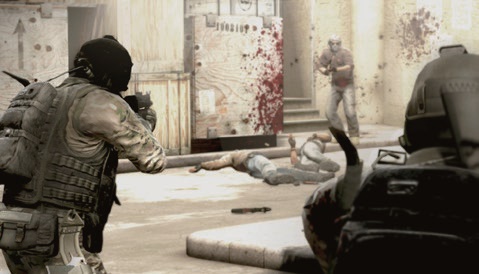
“Counter-Strike: Global Offensive” where special forces and terrorists compete against each other for annihilation (From Steam | CounterStrike: Global Offensive)

“Call of Duty: Infinite Warfare” based on survival theme to survive the war (from Steam | Call of Duty: Infinite Warfare)
Based on the data as of 2018, one example is “Counter-Strike: Global Offensive”, which ranks third in total prize money. The total prize money is about 47.61 million dollars. There are 9211 participating players in 3031 tournaments. It was released in 2012. Although it is a popular work played by nearly 10,000 people, its setting is aimed at annihilating each other with a composition between “Special Forces vs. Terrorists”.
A similar title “Call of Duty: Infinite Warfare” is another example. Under the theme of war, players fight it out in the battlefield and there are many die-hard fans.
On the other hand, the “Tekken” series and the “Street Fighter” series, which are known as martial arts games that have become Japan’s leading e-sports, are attracting attention. “Street Fighter V” was ranked 23rd with a total prize money of 1.89 million dollars and “Ultra Street Fighter IV” was 46th with 730,000 dollars.
“FIFA17” of soccer is a game officially recognized by the International Football Federation (FIFA) and is said to be a work closest to the general public, ranked 30th with a total prize money of 1.46 million dollars. There is also “Winning Eleven” which was adopted in the National Sports Festival and last year’s Asian Games, but in terms of global popularity, it is lagging behind the “FIFA” series. This time, “Gran Turismo SPORTS”, which was adopted as an event in the National Sports Festival, has developed independently from other e-sports because their tournaments have been held by Gran Turismo fans.
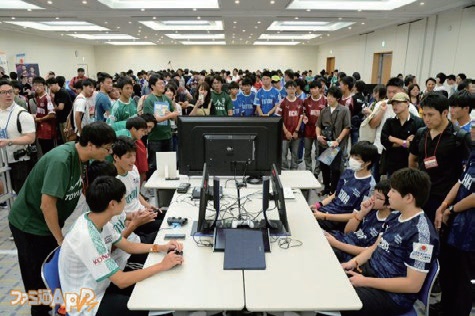
From Famitsu AppVS event report
With the goal of being adopted as the Olympic Games in mind, the e-sports industry may be forced to remove e-sports on wars and battles. While many war/combat e-sports games have been developed by Western game companies, many of the titles currently attracting attention were made in Japan. In sports games such as 3)”Winning Eleven”, “Street Fighter”, “Gran Turismo” and “Power Pro” (Powerful Pro Baseball), Japan can be said to be ahead of Europe and the United States.
If it is to become an Olympic event, it will be necessary to unify the titles. Depending on the title, companies that have the copyright/sales right of the title stand at the forefront. Including the challenge for JeSU to put them together, there are many challenges ahead. That is why Japan’s future trends are attracting the world attention increasingly.
Notes
1) E-sports
“E-sports” are entertainment, competition and sports in general which use electronic devises; a sporting competition that uses computer games and video games. Abbreviation for “electronic sports”. A game where multiple players play is interpreted as sports and called “e-sports”.

(From the lively Ibaraki Yume National Sports Festival, lively Ibaraki Yume Festival executive committee secretariat website)
2) Cultural program
A cultural program is one of the events of the National Sports Festival, and it aims to excite the Festival by implementing a program on the theme of sports culture and the local culture of the host prefecture. At the same time, the program tries to spread the charm of Ibaraki nationwide through cultural and artistic activities of the citizens of the prefecture.
3) “Winning Eleven”
The soccer game “eFootball Winning Eleven 2020” has two sections, namely a boy section (high school students) and an open section (no age limit). The team that won the tournament through the online qualifying preliminary and the off-line final game entered the main tournament.
The regulation uses the “PESLEAGUE CO-OP” mode in which three people work together to operate one team. The number of team members for each representative team is allowed to be 3 to 5, and it is a unique feature not found in other titles that up to 5 team members can freely operate, such as changing the players to play (so-called reserve players), coaching as a supervisor, or a cheer leader.(From Famitsu AppVS event report)
More contents available in the electronic “Salaam Quarterly Bulletin”, No.31, November 2019.
